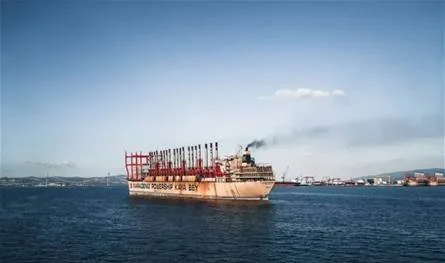
Turkey is moving rapidly towards achieving sufficiency of more than half of its natural gas needs by the end of 2028, by increasing its domestic production and expanding its imports from the United States, in a step that is expected to radically transform the energy map of the region and weaken the position of Russia and Iran as major exporters to Ankara.
These steps come in light of public pressure from Washington on its allies to cut economic ties in the energy sector with Moscow and Tehran. During their meeting at the White House on September 25, US President Donald Trump called on his Turkish counterpart Recep Tayyip Erdogan to reduce his country’s dependence on Russian energy.
Analysts point out that Ankara is benefiting from the abundance of liquefied natural gas in global markets to enhance its energy security and achieve its ambition to become a regional center for gas trade. Sahbet Karbuz of the Mediterranean Energy and Climate Organization said that Türkiye “seeks to invest global surpluses in liquefied gas to secure its needs and expand its strategic options.”
Although Russia is still the largest supplier to Turkey, its share decreased from more than 60% two decades ago to about 37% in the first half of 2025, after most European countries reduced their Russian imports following the outbreak of the Russian-Ukrainian war in 2022.
The long-term gas contracts between Moscow and Ankara, which supply Turkey with about 22 billion cubic meters annually via the “Blue Stream” and “Turkish Stream” lines, are approaching their end, and the Iranian gas contract amounting to 10 billion cubic meters expires in the middle of next year. In contrast, Azerbaijani gas contracts amounting to 9.5 billion cubic meters extend until 2030 and 2033.
Karboz believes that Türkiye will extend some of these contracts, but with more flexible terms and smaller quantities to enhance the diversity of supplies. In parallel, the Turkish state oil and gas company TPAO is working to develop local gas fields, while Turkish companies have expanded the establishment of new stations to import liquefied natural gas from the United States and Algeria.
According to Reuters calculations, Turkish domestic production and LNG imports are expected to exceed 26 billion cubic meters annually from 2028, up from the current 15 billion cubic meters, with US LNG imports doubling. These quantities will cover more than half of the domestic demand of about 53 billion cubic metres, which will reduce dependence on supplies coming via pipelines from Russia, Iran and Azerbaijan.
To stabilize this transformation, Ankara signed a series of long-term agreements with American companies worth $43 billion, most notably a 20-year contract with Mercuria last September. The annual capacity of Turkey’s liquefied gas import terminals reached 58 billion cubic meters, which is enough to cover its entire needs.
Although Russian gas continues to flow at full capacity, the Kremlin indicated that cooperation with Türkiye remains strong. But energy experts, such as Alexei Belogorev of the Institute of Energy and Finance in Moscow, believe that Turkey could theoretically stop Russian imports within two to three years, although it will not do so because of the competitive prices of Russian gas, which gives it negotiating power over other suppliers.
In the same context, Turkish Energy Minister Alp Arslan Bayraktar explained that his country will maintain diversity in supply sources from Russia, Iran, and Azerbaijan, but he pointed out that American liquefied gas is a more efficient economic option.
Analysts expect Türkiye to rely on Russian and Iranian gas to meet its domestic needs, while re-exporting American liquefied gas and some of its domestic production to Europe after the European Union implements its decision to permanently ban Russian gas by 2028.
Indeed, the Turkish company Botash has signed agreements to supply quantities of gas to Hungary and Romania, strengthening Ankara’s ambition to become a regional center for energy trade. At the same time, Turkish-Russian relations continue in other areas, as the Russian company Rosatom is building the first nuclear plant in Türkiye, while Moscow remains the largest supplier of crude oil and diesel to Ankara.
(CNN Economic)

















